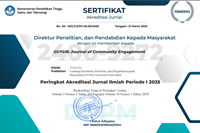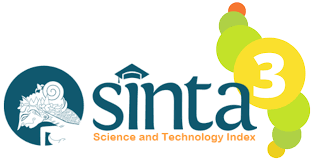Al-Qudah, A. A., Al-Okaily, M., & Alqudah, H. (2022). The relationship between social entrepreneurship and sustainable development from economic growth perspective: 15 ‘RCEP’ countries. Journal of Sustainable Finance and Investment, 12(1), 44–61. https://doi.org/10.1080/20430795.2021.1880219
Aleksi, R. (2020). International Journal of Disaster Risk Reduction Conceptualizing community in disaster risk management. 45(January). https://doi.org/10.1016/j.ijdrr.2020.101485
Atalay, A. S., & Meloy, M. G. (2020). Improving Evacuation Compliance through Control : Implications for Emergency Management Policy and Disaster Communications. Journal of Nonprofit & Public Sector Marketing, 32(4), 364–378. https://doi.org/10.1080/10495142.2020.1798855
Bacq, S., Ofstein, L. F., Kickul, J. R., & ... (2017). Perceived entrepreneurial munificence and entrepreneurial intentions: A social cognitive perspective. … Small Business Journal. https://doi.org/10.1177/0266242616658943
Green, G. P., Flora, J. L., Flora, C., & Schmidt, F. E. (1990). Local Self-Development Strategies: National Survey Results. Community Development Society. Journal, 21(2), 55–73. https://doi.org/10.1080/15575339009489961
Hutagalung, S. S., & Indrajat, H. (2020). Adoption Of Local Wisdom In Disaster Management In Indonesia. International Journal of Scientific & Technology Research, 9(03), 48–52.
Korsching, P. F., & Allen, J. C. (2004). Local Entrepreneurship: A Development Model Based on Community Interaction Field Theory. Community Development Society. Journal, 35(1), 25–43. https://doi.org/10.1080/15575330409490120
Liu, Y., Cheng, P., & OuYang, Z. (2019). Disaster risk, risk management, and tourism competitiveness: A cross-nation analysis. International Journal of Tourism Research, 21(6), 855–867. https://doi.org/10.1002/jtr.2310
Lorenzo-Afable, D., Lips-Wiersma, M., & Singh, S. (2020). ‘Social’ value creation as care: the perspective of beneficiaries in social entrepreneurship. Social Enterprise Journal, 16(3), 339–360. https://doi.org/10.1108/SEJ-11-2019-0082
Méndez-Picazo, M. T., Galindo-Martín, M. A., & Castaño-Martínez, M. S. (2021). Effects of sociocultural and economic factors on social entrepreneurship and sustainable development. Journal of Innovation and Knowledge, 6(2), 69–77. https://doi.org/10.1016/j.jik.2020.06.001
Mohan, P., & Mittal, H. (2020). Review of ICT usage in disaster management. International Journal of Information Technology, 12, 955–962. https://doi.org/10.1007/s41870-020-00468-y
Nair, B. B., & Dileep, M. R. (2020). A study on the role of tourism in destination’s disaster and resilience management. Journal of Environmental Management and Tourism, 11(6), 1496–1507. https://doi.org/10.14505/jemt.v11.6(46).20
Nuruddin, M. (2021). Kecamatan Ujung Pangkah Dalam Angka 2021.
Secundo, G., Del Vecchio, P., & Mele, G. (2021). Social media for entrepreneurship: myth or reality? A structured literature review and a future research agenda. International Journal of Entrepreneurial Behaviour and Research, 27(1), 149–177. https://doi.org/10.1108/IJEBR-07-2020-0453
Shafieisabet, N., & Haratifard, S. (2020). The empowerment of local tourism stakeholders and their perceived environmental effects for participation in sustainable development of tourism. Journal of Hospitality and Tourism Management, 45(October 2019), 486–498. https://doi.org/10.1016/j.jhtm.2020.10.007
Sukmono, N. (2019). Desa Wisata Mati Suri Akan Dievaluasi. Gatra.Com. https://www.gatra.com/news-456960/gaya-hidup/https:/news-18620-static-disclaimer.html
Xu, Y., Qiu, X., Yang, X., Lu, X., & Chen, G. (2020).
Disaster risk management models for rural relocation communities of mountainous southwestern China under the stress of geological disasters. International Journal of Disaster Risk Reduction, 50. https://doi.org/10.1016/j.ijdrr.2020.101697
Creswell, J. W. (2018). Research design : qualitative, quantitative, and mixed methods approaches / John W. Creswell, J. David Creswell (Fifth edition.. ed.): Thousand Oaks, California : SAGE Publications, Inc.
Jacobs, S. D. (2018). A history and analysis of the evolution of action and participatory action research. The Canadian Journal of Action Research, 19(3), 34-52. doi:https://doi.org/10.33524/cjar.v19i3.412
Kindon, S. (2007). Participatory Action Research Approaches and Methods : Connecting People, Participation and Place. Hoboken: Hoboken : Taylor & Francis.
McIntyre, A. (2008). Participatory action research Los Angeles: Los Angeles : Sage Publications.
McNiff, J. (2010). You and your action research project / Jean McNiff and Jack Whitehead. London New York: London New York : Routledge.
Ritzer, G. (1975). Sociology: A Multiple Paradigm Science. The American Sociologist, 10(3), 156-167. doi:10.2307/27702185
 (UIN Sunan Ampel Surabaya)
(UIN Sunan Ampel Surabaya) 









.png)
